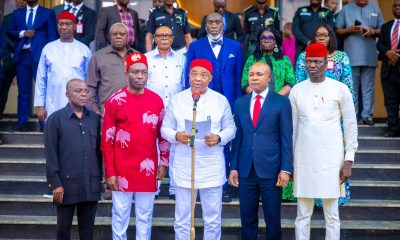
Local
‘Nnamdi Kanu Didn’t Jump Bail,’ – Ejimakor

‘Nnamdi Kanu Didn’t Jump Bail,’ – Ejimakor
Aloy Ejimakor, the lawyer for Nnamdi Kanu, the leader of the Indigenous People of Biafra, IPOB, has said that the agitator is prepared to demonstrate to the world that he did not flee the country in 2017.

iexclusive News Nigeria gathered that the lawyer stated that the IPOB leader will establish that the Nigerian government forced him to quit the country.

According to Ejimakor, the military raid of Kanu’s apartment and the threat to his life prevented him from attending his trials and fleeing Nigeria.
Kanu was arrested and charged with treason in 2017.
In 2017, he was granted bail by Justice Binta Nyako of an Abuja Federal High Court.
On the other hand, Kanu was unable to proceed with his trial following a military raid of his residence in Afaraukwu, Abia State.
Following the military assault, the IPOB commander escaped to Europe, managing and coordinating his pro-Biafra activities.
He was apprehended by the Nigerian government in an African country thought to be Kenya and repatriated to Nigeria to face Justice Nyako.
Justice Nyako had directed that he be remanded in the custody of the Department of State Services, DSS, upon his return.
Throughout this, crazy rumors have circulated that Kanu escaped bail in 2017.
Ejimakor denied the allegations of bail jumping, stating that Kanu fled the nation due to the threat to his life.
“Despite everything he has been through, Nnamdi Kanu was in a good mood when I visited with him yesterday, July 17; and he is looking forward to the first opportunity to refute this whole lie about him jumping bail,” Ejimakor stated.
He has never had such a chance, even though he previously requested it in the correct forum.
“In my considered opinion, Kanu never escaped bail; something compelled him to quit Nigeria and skip his October 2017 trial.
“That something was the military assault of his homestead, which was later brought to the court’s notice in a never-heard application.
“Perhaps this entire sad scenario may present the first opportunity to address the nagging issue of bail jumping, as it will readily be established that Kanu never voluntarily chose not to appear at his trial.
Jumping bail requires the criminal to make a voluntary act.
“Kanu’s case is entirely one of involuntary conduct or omission brought about by the activities of the Nigerian government, which put him on trial and so had an abiding legal interest in his continued presence in Nigeria to face prosecution.
In reality, it is the same Nigerian government that asserts Kanu jumped bail and so hopes to benefit from it that obliterated Nnamdi Kanu’s capacity or obligation to attend at his trial.
“It would be irrational for anyone to assume that Kanu jumped bail on the preponderance of the evidence. It is not as simple as jumping bail. Rather than that, it is a textbook example of an adversarial party coercing Nnamdi Kanu into fleeing, only to turn around and accuse him of jumping bail.
“Once you get over the question of Nnamdi Kanu breaching bail, the bench warrant that was used to extradite him from Kenya will appear to be incorrect in retrospect.
It is a chain of causality. Nnamdi Kanu was on bond when the government attacked his residence, and to his credit, he escaped safely.
However, rather than hearing him explain why he went, you declare him a fugitive and eventually extradite him as a result. That is intolerable.
Governments cannot profit from their own mistakes.
“The rendition is untenable because this entire situation was precipitated by the invasion, not Kanu. However, even if he evades extradition, extradition, not extraordinary rendition, is the only lawful means of returning him to Nigeria. However, I can assure you that under Kanu’s particular circumstances, any extradition procedures, whether in the United Kingdom or Kenya, would have been summarily dismissed. That is presumably why Nigeria never applied. Furthermore, while extraordinary rendition may be a Pyrrhic success, it generates a slew of legal, political, and diplomatic complications for any individuals or groups participating in it.”




























